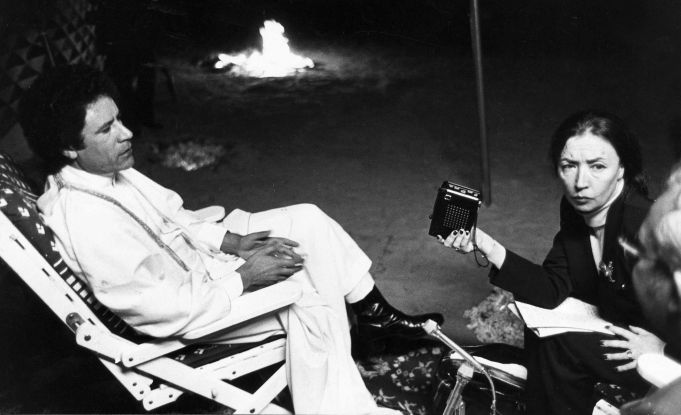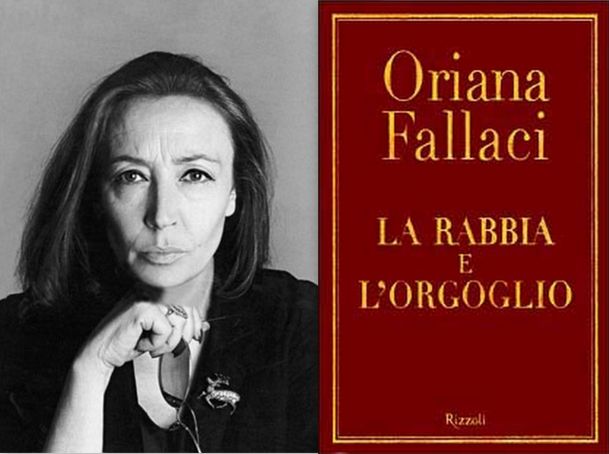Oriana Fallaci is considered to be the most influential and controversial Italian female journalist of the 20th century.
She led an extraordinary and remarkable life, documenting and exploring the world with the goal of seeking truth, in a society mainly dominated by male figures.
Born in 1929 in Florence to working-class parents, Fallaci started her life in the middle of the fascist regime and soon became a part of the underground resistance movement against Nazism, guided by her father. The indistinguishable temper that characterized Oriana Fallaci may have formed during her early years, growing up in a society oppressed by a dictatorship and fighting for freedom along with her family.
The endless fight for freedom contributed to shaping her admiration towards courage and heroism. This led the journalist to fall in love with Alexandros Panagoulis, a Greek politician that was sentenced to prison after unsuccessfully attempting to assassinate the Greek dictator Georgios Papadopoulos in 1968. The relationship ended in 1976 when Panagoulis passed away in a car accident, which caused her future relationships to often end with her refusing to ever mention her partners.
Fallaci’s involvement with social justice and politics came with it a need to seek isolation, in order to produce her work. After her death in 2006 caused by lung cancer, she is often remembered by her unique and strong character, as well as her controversial statements towards Islam.
So how did Oriana Fallaci manage to shock the world with her controversy, but at the same time reach her extensive notoriety?

Fallaci during an interview with Muʿammar Gheddafi
The Italian journalist managed to get involved in reportages all over the world, interviewing celebrities such as Italian director Federico Fellini and actor Marcello Mastroianni. She succeeded in astonishing the public with her captivating and strong interviews, structured as if they were interrogations. Fallaci’s drive for documenting while addressing the favouritism and class privileges for males in society, led her to get a hold of influential politicians such as Henry Kissinger, architect of Richard Nixon’s foreign policy; Ali Bhutto, the dictator of Pakistan; Ruhollah Khomeyni, the Iranian religious leader who established the Islamic Republic in Iran; Mohammad Reza Pahlavi, the last Shah of Persia, and Muʿammar Gheddafi, the dictator of Libya.
Up to date local news in Florence
She was the only Italian journalist in the field during the Vietnam war, often traveling there and back to Italy from 1967 until the end of the war in 1975. Oriana Fallaci also had the opportunity to report historic American events such as the Detroit Riots after the assassination of Martin Luther King in 1967, as well as the assassination of Robert F. Kennedy in 1968. While traveling the world observing the social disadvantages caused by gender inequality, she noticed that in the Islamic culture, extending from the Atlantic to the Indian Ocean, women were restricted and unhappy compared to men, and not comfortably allowed to achieve thier desires.
Oriana Fallaci officially criticized and revolted against Islam after an interview with the Iranian religious leader Khomeyni and began to be associated with the term “Islamophobia”, defined as the dislike, fear and prejudice against Muslims or Islam.
She expressed her disagreement on women’s status in Islamic culture writing, “These veiled women are the unhappiest women in the world. The wearer gazes out at the sky and her fellow man, like a prisoner peering through the bars of her prison.”
This statement enforces her opposition to social injustice in Islamic culture, which grew even more after the tragic event of 9/11 in the United States.

Oriana Fallaci and "The Rage and the Pride"
The journalist published a very aggressive and, according to critics at the time, politically incorrect book called “The Rage and the Pride”, shocking the audience with phrases such as, “Muslims breed like rats”, ultimately resulting in an episode in court on defamation charges against Islam. The controversial script instantly became a journalistic product of extraordinary impact and success, even to those that did not share her argument.
Over the course of the following years, she continued to cover the local news until she fell seriously ill and wanted to go back to Florence, where she passed away on 15 September 2006, aged 77.
Oriana Fallaci will always be remembered for being one of the strongest and most independent women of the 20th century, as well as one of the most controversial journalistic figures of western societies.




















